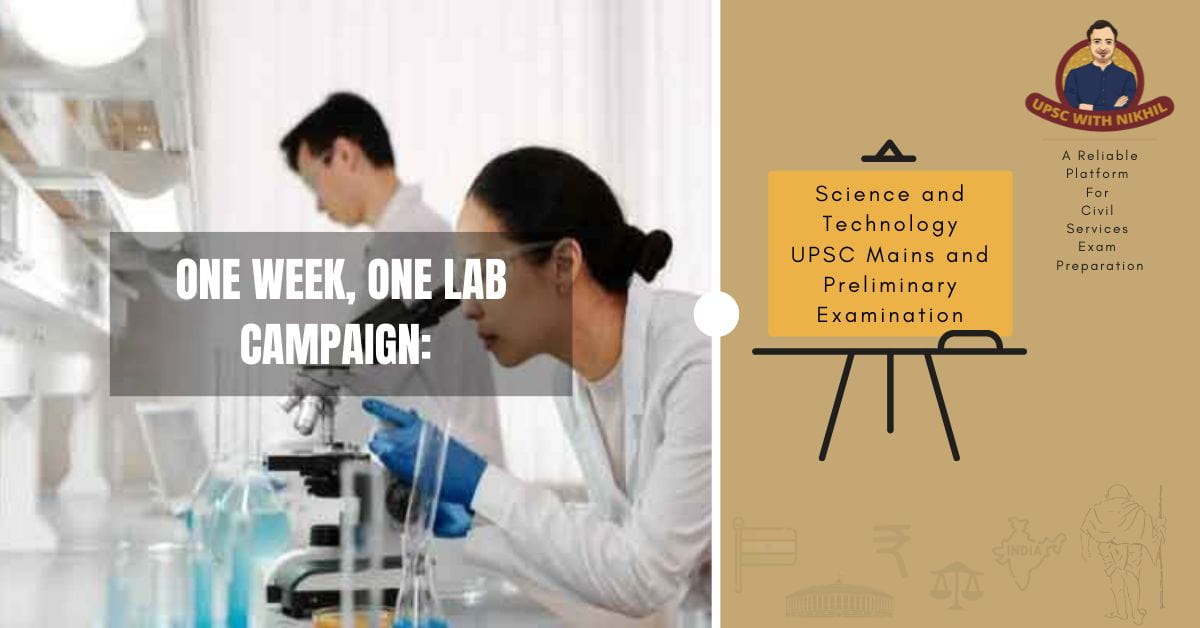One Week, One Lab Campaign:
Introduction
The theme-based campaign "One Week One Lab" aims to inspire the next generation of innovators, students, start-ups, academics, and business people to explore potential in deep technology. The Council of Scientific and Industrial Research (CSIR) launched the One Week, One Lab programme to promote opportunities in deep technology start-up businesses.
Dr. Jitendra Singh, the Union Minister for Science & Technology, recently announced that the CSIR's "One Week, One Lab" national programme would begin on January 6, 2023.
The Minister also introduced the organization's new slogan, "CSIR-The Innovation Engine of India."
The One Week, One Lab Campaign Is What?
About: The theme-based campaign "One Week One Lab" aims to inspire young innovators, students, start-ups, academia, and business to explore potential in deep technology.
Goal: The One Week, One Lab Campaign's main goal is to provide the people of India a glimpse into the unique inventions and technological advancements that the various CSIR institutes have been working on.
Participation: The CSIR's One Week, One Lab Campaign will involve all 37 of its best laboratories and institutes, which are dispersed around the nation.
Parent Ministry: The Ministry of Science and Technology is providing overarching leadership and oversight for the One Week, One Lab Campaign.
Additional CSIR Programs To Advance Science In The Nation:
Special Requests for Proposals for Research Grants from Women Scientists: Women scientists, especially those who have taken a professional hiatus and are interested in returning to research and re-establishing their career, are invited to submit proposals for research grants.
E-Office/E-Appraisal: A paperless E-office will be implemented in all labs starting on April 1, 2023, and an E-performance appraisal system for admin cadre workers will be introduced for the Reporting Year 2022–2023 as well.
Collaboration: Research, academia, and industry now have several chances to collaborate in meaningful ways with equal stakes. This is thanks to CSIR advancements. For instance, drone technology, heliborne technology, cutting-edge sewage cleanup equipment, and the Aroma Mission
Modern Heli-borne survey technology: It was used last year in the States of Rajasthan, Gujarat, Punjab, and Haryana with assistance from the Jal Shakti Ministry, this may have a significant positive impact on Prime Minister Narendra Modi's vision and mission of "Har Ghar Nal Se Jal."
Similar to this, the CSIR-developed automated sewage cleaning technology will aid in Swachh Bharat Mission's achievement of its goal.
Council For Scientific And Industrial Research (CSIR):
Establishment: The Societies Registration Act, 1860, authorized the establishment of the CSIR on September 26, 1942, and it was registered as a CSIR Society.
• The Bye Laws for the Council were among the issues on the agenda for the first meeting of the Governing Body, which took place on March 9th, 1942.
New slogan: The Minister of Science and Technology also unveiled the new tagline, "CSIR-The Innovation Engine of India," in accordance with the changes taking place within the organization.
Regulatory Structure: President of the Council for Scientific and Industrial Research is Prime Minister Narendra Modi (CSIR).
• The Vice President of CSIR is the Union Minister for Science and Technology.
CSIR Laboratories: Each CSIR laboratory is distinct and specializes in a variety of fields, from geology to material science, from food to fuel.


